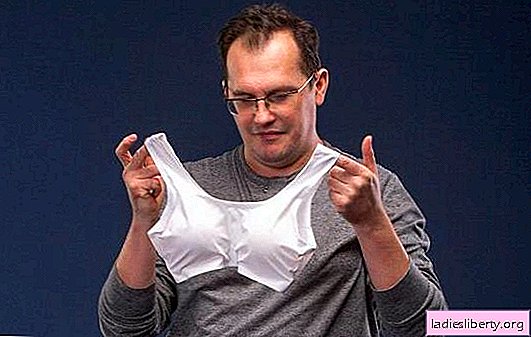
"True" gynecomastia is an increase in milk tissue in men. In every second man, small "nests" of breast tissue are found. Under the influence of female sex hormones, they can increase in size. However, even medications can increase breasts to a large extent.
What is gynecomastia?
Gynecomastia is not an independent disease, but a symptom that indicates a hormonal imbalance. True gynecomastia is different from "pseudo-gynecomastia", or lipomastia: in this case, the enlargement of the male breast is due to fat.
In most cases, patients have a mixed form. Both breast tissue and an increased amount of fat are present.
Gynecomastia can be a normal or pathological change.
In 80% of cases, the exact cause cannot be determined..
This also applies to "pseudo-gynecomastia."
What drugs cause gynecomastia?
Treatment with female hormones or analogues of male hormones leads to gynecomastia. In other drugs, the mechanism of action has not yet been studied.
Spironolactone - a diuretic drug, which often leads to an increase in breast tissue. Even stomach aids (H2 blockers), psychotropic drugs, and antidepressants cause true gynecomastia.
Risperidone - A well-known antipsychotic that most often causes this adverse effect. To find out if the drug causes gynecomastia, you need to read the instructions for use.
Heroin and methadone breast enlargement only after prolonged use. A side effect is due to a high concentration of prolactin in the blood - "hyperprolactinemia". Also, other drugs can cause gynecomastia with prolonged use.
Risperidone scandal: this drug most often increases breast
According to the clinical report, about 24% of patients have gynecomastia after taking risperidone. For approximately 10 years, patients did not know about this side effect. According to media reports, more than 13,000 men are currently suing the Johnson & Johnson pharmaceutical company.
Gynecomastia is a side effect that is capable of causing psychological disorders. The pharmaceutical company denies all allegations and believes that the reason is other drugs. According to representatives, the drug has helped millions of people cope with anxiety disorder.
What conditions cause hyperprolactinemia and how to identify it?
The pituitary gland produces prolactin - hormone that stimulates the mammary gland. During pregnancy or under severe stress, the content of this hormone increases. In rare cases, a tumor in the pituitary gland can lead to the multiplication of these cells and an increase in prolactin production.
When collecting a medical history, questions are asked about taking medications and possible liver diseases. This is followed by a detailed examination of the chest and testicle, as well as a blood test to determine the state of the hormones. To exclude breast cancer in men, an ultrasound scan and, possibly, mammography are performed.
How is gynecomastia treated?
With a lack of sex hormone, the male hormone is replaced with artificial drugs. With an excess of prolactin, drug therapy with dopamine antagonists should be started. The exact scheme of therapy is determined by the doctor. It is not recommended to self-medicate without consulting a specialist.
If, despite treatment, gynecomastia does not disappear, surgical removal is necessary. External exposure is not indicated due to the occurrence of cancer of the glands.
Removal of breast tissue during gynecomastia is carried out only if other treatment measures are ineffective. Men with breast tissue may develop breast cancer, albeit at a much lower rate than women.
If the first signs of gynecomastia occur, urgently need to consult a doctor. Timely therapy helps completely reverse breast growth, even at a late stage. Self-medication is categorically not recommended, as improper therapy can lead to unpredictable health consequences.











